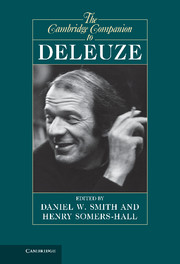Book contents
- Frontmatter
- Contents
- Contributors
- Abbreviations
- Introduction
- 1 Deleuze and the history of philosophy
- 2 Difference and Repetition
- 3 The Deleuzian reversal of Platonism
- 4 Deleuze and Kant
- 5 Phenomenology and metaphysics, and chaos
- 6 Deleuze and structuralism
- 7 Deleuze and Guattari
- 8 Nomadic ethics
- 9 Deleuze’s political philosophy
- 10 Deleuze, mathematics, and realist ontology
- 11 Deleuze and life
- 12 Deleuze’s aesthetics of sensation
- 13 Deleuze and literature
- 14 Deleuze and psychoanalysis
- 15 Deleuze’s philosophical heritage
- Bibliography
- Index
- References
5 - Phenomenology and metaphysics, and chaos
On the fragility of the event in Deleuze
Published online by Cambridge University Press: 05 December 2012
- Frontmatter
- Contents
- Contributors
- Abbreviations
- Introduction
- 1 Deleuze and the history of philosophy
- 2 Difference and Repetition
- 3 The Deleuzian reversal of Platonism
- 4 Deleuze and Kant
- 5 Phenomenology and metaphysics, and chaos
- 6 Deleuze and structuralism
- 7 Deleuze and Guattari
- 8 Nomadic ethics
- 9 Deleuze’s political philosophy
- 10 Deleuze, mathematics, and realist ontology
- 11 Deleuze and life
- 12 Deleuze’s aesthetics of sensation
- 13 Deleuze and literature
- 14 Deleuze and psychoanalysis
- 15 Deleuze’s philosophical heritage
- Bibliography
- Index
- References
Summary
Deleuze is frequently characterized as a critic of phenomenology. Yet, Deleuze’s thought cannot be understood unless we recognize its similarities to phenomenology. There are in fact three similarities. First, phenomenology takes up what Deleuze in Difference and Repetition calls “the task of modern philosophy”; that task is to reverse Platonism (DR 59). Through the epoché, phenomenology reduces any transcendent world or transcendent thing in itself to a phenomenon; anything transcendent comes to be located within experience. Second, through the preposition “within,” we see that the reversal of Platonism amounts to a reduction to immanence. No greater debt to phenomenology appears in Deleuze’s thought than in his use of the word “immanence.” Immanence in both Deleuze and in phenomenology refers to a transcendental (but not transcendent) ground. A third similarity appears in the fact that the grounding relation in both phenomenology and in Deleuze’s thought is paradoxical. All transcendental philosophy results in a paradoxical relation: the ground of experience must remain within experience (the ground must not be separate from the grounded) and the ground must be at the same time different from what it grounds (the ground must not resemble what it grounds). In other words, the ground must remain immanent and yet, as immanent, not result in a vicious circle. It must be the case that what is being grounded is not presupposed in the ground.
It is in relation to the third similarity – the paradoxical relation of ground and grounded – that we can see Deleuze’s specific criticism develop. Both phenomenology and Deleuze seek the elimination of all transcendence; both seek to arrive at a plane of immanence. Despite the similarity however, phenomenology defines immanence by a dative relation; it relates the plane of immanence back to – in this “to,” we have the dative relation – a subject or consciousness that constitutes the given (WP 46). In order, however, for there to be a pure plane of immanence, a plane with no transcendence whatsoever, there must be no dative relation. In other words, the plane of immanence must not be an image of something else. In particular, it must not be an image of what it is attempting to ground.
- Type
- Chapter
- Information
- The Cambridge Companion to Deleuze , pp. 103 - 125Publisher: Cambridge University PressPrint publication year: 2012
References
- 6
- Cited by



